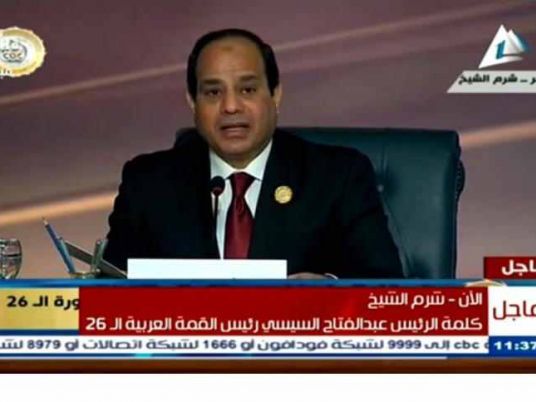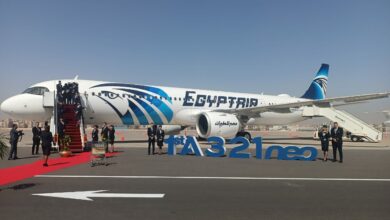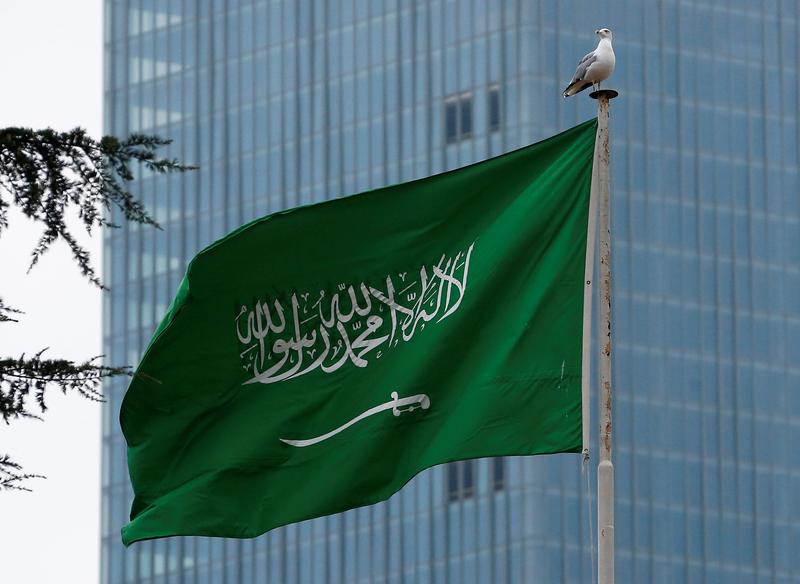
Egypt and Saudi Arabia are cooperating militarily to thwart a power grab in Yemen by Shiite rebels, but the agreement on how to deal with the region's complex and intertwined conflicts may stop there.
The two countries' diverging interests were evident at the Arab summit over the weekend, particularly over the crises in Syria and Libya.
In Syria's civil war, Saudi Arabia has staunchly stuck by its demands for President Bashar Assad's removal. In a speech to the summit in the Egyptian resort of Sharm el-Sheikh, Saudi King Salman railed against "those with blood on their hands" and said he cannot be any part of a resolution to the war, now in its fifth year.
In contrast, President Abdel-Fattah el-Sissi in his speech urged a political solution, pointing to the need to "confront terrorist organizations" and prevent the collapse of Syrian state institutions. He said Egypt would host a conference of Syria's opposition aimed at unifying its position for political talks.
The speech reflected what el-Sissi has made his top priority since rising to office last year — fighting Islamic militants. Egypt's rhetoric has emphasized the need to preserve Syria as a bulwark against terrorists over the need to remove Assad, though the government has avoided saying that outright. On Friday, a government official told The Associated Press that the Egyptian stance is that Assad's regime "must be part of the negotiations and the transitional period."
"It is not about personalities," the official said, speaking on condition of anonymity to discuss the diplomatic efforts.
The differences led to an embarrassing moment after el-Sissi proudly had a letter from Russian President Vladimir Putin read out loud at the summit's closing session Sunday. Russia is a key supporter of Assad and has strong ties to el-Sissi, who gave Putin a lavish welcome in Egypt last month.
In his letter, Putin urged a political solution to the Syria war. After it was read, Saudi Foreign Minister Saud al-Faisal took the microphone and lashed out at Russia in a speech aired live on TV.
"They (Russians) speak about the misery the situation in Syria while they are a main part of the miseries that affects the Syrian people," al-Faisal said, pointing to Moscow's arms sales to Damascus.
El-Sissi thanked al-Faisal for his remarks and, in an apparent attempt to put the best spin on the awkward situation, commented that all Arab leaders emphasize that they seek solutions to regional crises in their contacts with international players. El-Sissi then gave a closing speech praising the new hopes for future joint action sparked by the summit, where the leaders agreed to create a new joint Arab military force. Egypt has been the strongest advocate for the force.
In Libya, el-Sissi wants regional action against the growing power of Islamic militants, whom Egypt and the United Arab Emirates have already hit with airstrikes several times the past year. In his opening speech to the summit, el-Sissi repeatedly spoke of the need for action in Libya. In contrast, the Saudi king hardly mentioned it — a sign of their differing priorities.
Egyptian columnist Abdullah el-Sinnawi, who is close to the military and el-Sissi, said the lack of agreement is likely to paralyze any future communal action, including through the joint military force.
The two sides don't agree on who the "enemy is, how to hit and what is the priority," el-Sinnawi told AP.
Notably, Assad — who did not attend the summit — told Russian reporters ahead of the gathering that Egypt understands the crisis in Syria and that there is limited security cooperation between the two countries. "We hope to see closer Syrian-Egyptian relations," he said.
After al-Faisal's speech, a prominent Egyptian TV political show host lay into Saudi Arabia, saying it was equally to blame for Syria's bloodshed with its support of anti-Assad rebels.
"Will you keep lying to us and yourself and the world?" Eissa barked. "Yes, the repressive dictator is killing his people. And this Gulf Arab oil money from Saudi Arabia and Qatar is also killing the Syrian people."
That prompted an angry response from prominent Saudi columnist Jamal Khashoggi, who said in a tweet that Eissa's "excesses" required action.
"If the media there (in Egypt) was free, I wouldn't have said that. But it is the regime's media," Khashoggi wrote.




